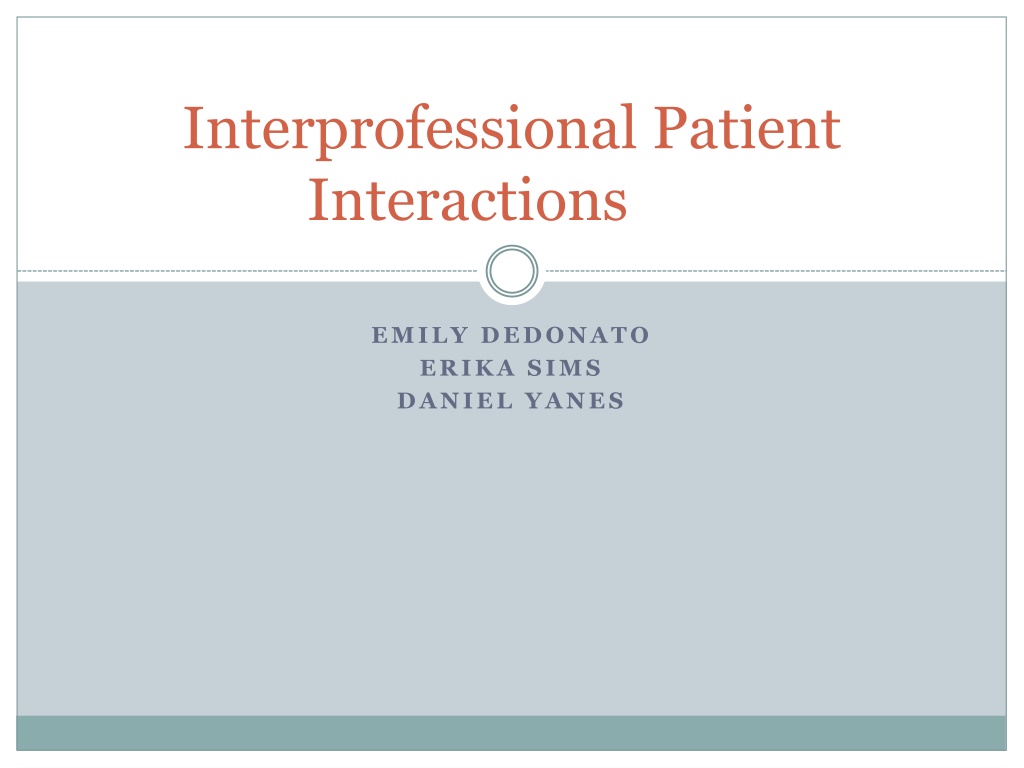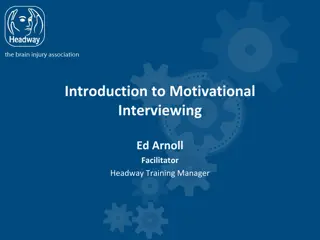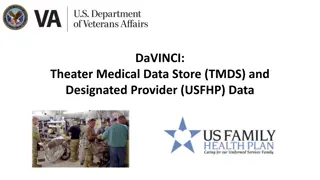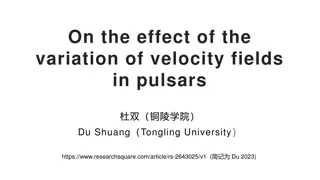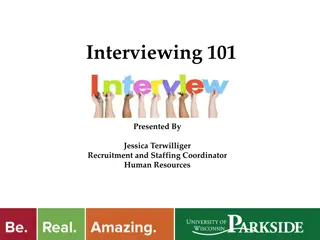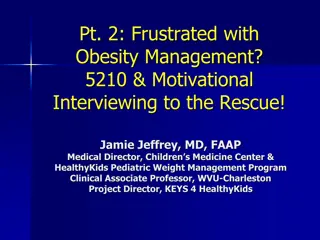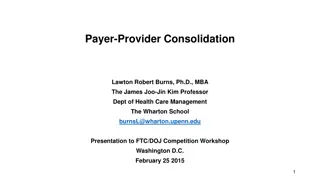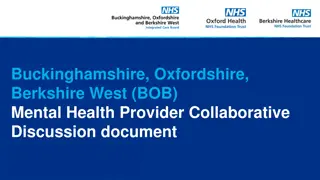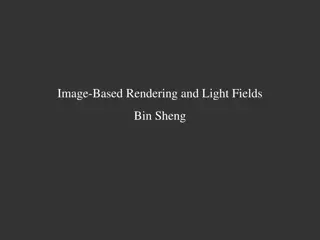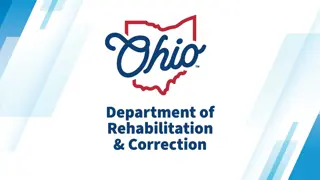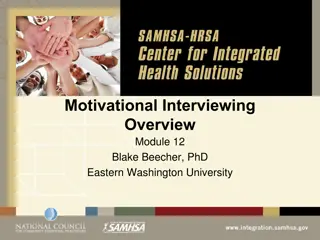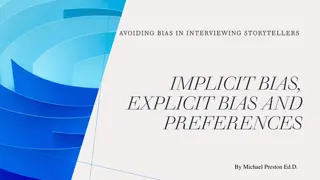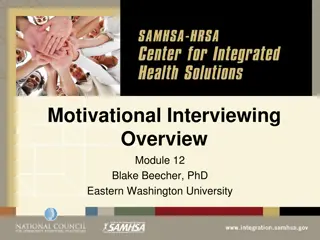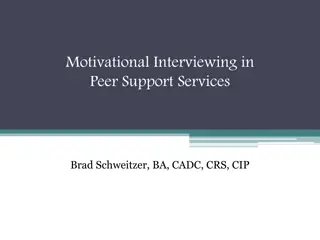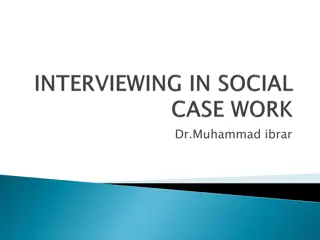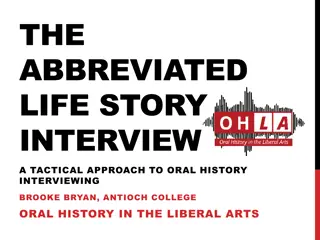Contrasting Healthcare Provider Interviewing Techniques Across Fields
Interviewing techniques of healthcare providers from various fields like Medicine, Pharmacy, Nursing, Physical Therapy, Dentistry, and Social Work are compared to understand their patient interactions. Each field emphasizes different aspects during patient interviews, leading to a diverse approach in delivering care. Learning skills from distinct disciplines can enhance one's patient interaction abilities.
- Healthcare Providers
- Patient Interactions
- Healthcare Fields
- Interviewing Techniques
- Interprofessional Communication
Download Presentation

Please find below an Image/Link to download the presentation.
The content on the website is provided AS IS for your information and personal use only. It may not be sold, licensed, or shared on other websites without obtaining consent from the author. Download presentation by click this link. If you encounter any issues during the download, it is possible that the publisher has removed the file from their server.
E N D
Presentation Transcript
Interprofessional Patient Interactions EMILY DEDONATO ERIKA SIMS DANIEL YANES
AGENDA We interviewed several healthcare providers and professional students on how they interview patients Today we will compare and contrast the interviewing techniques and training of the following fields: Medicine Pharmacy Nursing Physical Therapy Dentistry Social Work
WHY IS THIS IMPORTANT? Each field has its own methods and tactics when it comes to talking to a patient Understanding how each provider interviews a patient helps get a glimpse into the care that they provide Which things do different providers emphasize? What information is best gathered by a specific provider? Can we learn and utilize skills from different disciplines and incorporate them into our own patient interactions?
MEDICINE COMPONENTS OF THE INTERACTION HPI - CODIERS PMH SHx and FHx ROS Physical Exam Points of emphasis Open-ended questions and patient-centered interviewing Eliciting the patient s story in full detail to help guide medical decision making Must be comprehensive and thorough Key physical exam findings, both normal and abnormal
PHARMACY WHAT ARE YOUR THOUGHTS?
PHARMACY HPI SCHOLAR-MAC Symptoms, characteristics, history, onset, location, aggravating factors, remitting factors, medications, allergies, concomitant conditions HPI is largely focused on current problem and other problems that could interfere with medications/induce side effects Training All questions must be open ended Do you have any questions? vs. What questions do you have? Start broad and go narrow What meds do you use Are you taking any OTC medications?
PHARMACY How it differs from medicine Interview is centered around medications and side effects Adherence to medication regimen Diet, nutrition, etc. Cost of medication and assessment of formulary is a key component of interviewing The most efficacious drug may not be the most available Less emphasis on physical exam Overall, very similar interview to physicians with a slightly shifted focus SOAP Notes, thorough HPI, etc.
NURSING What are your thoughts?
NURSING COMPONENTS OF THE INTERACTION SBAR Situation, Background, Assessment, Recommendation S Here s the situation B Relevant PMH, Vitals, acute events, etc. A I think her blood pressure is too high R Can we go up on the beta blocker? Incredibly variable spoke to 15 different nurses/nursing students, training and interviewing differs depending on area of specialization Points of emphasis Obtaining the most relevant information Focusing on patterns in patient care (how much they slept, I/Os, periodic assessment and re-assessment)
NURSING How it differs from medicine Focused interview and physical exam to look for subtle changes (vs. broader interview to formulate treatment plan) More emphasis on review of systems and constant monitoring See the patients in the hospital more frequently than physicians do Overall, very variable Wide range of responsibilities and tasks depending on area of focus (i.e. Cardiac ICU vs. outpatient family medicine) Nursing assessment informs physician s plan, and physician s assessment informs nursing s plan
PHYSICAL THERAPY What are your thoughts?
PHYSICAL THERAPY COMPONENTS OF THE INTERACTION Background information Review of systems Patient interview establishing diagnosis, monitor progress, and treatment strategy CC, How were you injured? When? Etc. What are the GOALS of treatment Points of emphasis Treatment priorities Treat pain? Achieve mobility? Avoid weakness? Etc. Conducting physical therapy actively showing exercises and assessing mobility
PHYSICAL THERAPY How it differs from medicine Physical exam is largely musculoskeletal full assessment of ROM, capacity, etc. Incredible detail Emphasize social history and goals of treatment Cure is not always a reasonable option, so quality of life is a major component of PT Age is often a key factor Active engagement in performing PT and physically assessing the patient is often part of the interview (vs. medicine where procedures are separate) Overall, PT focuses heavily on quality of life and is often consulted after a diagnosis or concern has been identified
DENTISTRY What are your thoughts?
DENTISTRY COMPONENTS OF THE INTERACTION Largely focused on dental examination as opposed to interviewing per se Much of the initial assessment is often performed by dental hygienists Highly procedural and concerned about both dental health and cosmetic outcomes Points of emphasis Making the patient feel comfortable Many people fear the dentist or do not recognize the importance of dental hygiene, and thus favorable interactions are key Focus on changes rather than HPI/CC based interviewing Less open-ended and more procedural
DENTISTRY How it differs from medicine Interviewing to elicit information is less of an emphasis in dentistry More focused exam head, neck, mouth, ENT Overall, very directed patient interactions, often focused on changes and deviations from norm, rather than an inciting event or acute complaint Very procedural Amicability is especially important for patients who may be uncomfortable
SOCIAL WORK What are your thoughts?
SOCIAL WORK COMPONENTS OF INTERACTION: PIE (Person in Environment) focused assessment Political, familial, institutional, physical, spiritual, social, cultural Psychosocial assessment Goal/desired outcome, Family information, Risk assessment/safety screen (general safety, violence, drug/alcohol use, etc.), support system, clinical recommendation Points of emphasis Openness and transparency with patients If a report to CPS must be made, the patients are told Goal is to empower patients Barriers to care, discharge, or follow up Economic resources and needs
SOCIAL WORK How it differs from medicine? Focuses on the patient s environment and access to care, rather than treating a particular ailment No physical examination or review of systems needed Overall, focus on psychosocial and holistic well-being and ensures proper access and resources to care The interview of a social worker can provide information that physicians may not be able to get at in their interview
WHAT VALUABLE SKILLS CAN WE INCORPORATE INTO OUR OWN INTERVIEW? PHARMACY When considering medications, think more about cost and access to medicine NURSING Focus on details and subtle changes in our patients, obtaining both a broad and narrow assessment PHYSICAL THERAPY Consider goals and priorities when thinking about patient care and treatment plans DENTISTRY Ensure patient satisfaction and attempt to make experiences positive SOCIAL WORK Think about the patient in their environment, and treat not just the patient, but their situation as well
THANK YOU Thank you to all other healthcare professionals that were contacted and provided information for this project A special thank you to the following people for allowing us to conduct in-depth interviews Pharmacy: Steven Kiss, UNC Pharmacy Nursing: Laura Niese, RN, Shelby Kiskis, RN, Brodie Babbo, RN Dentistry: Judy Reu, D3, The Ohio State University Physical Therapy: Dr. Brenna Congeni, DPT Social Work: Nicole Parente, MSW
